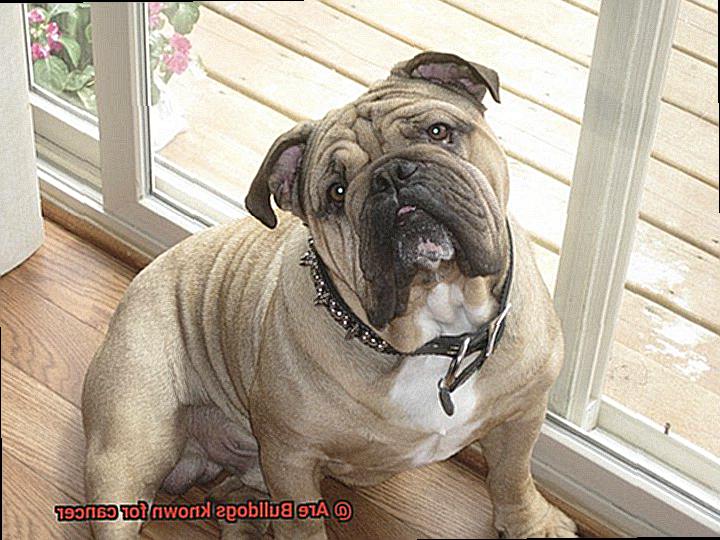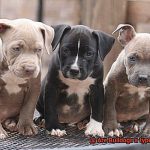Are Bulldogs known for cancer?
Picture this: you’re walking down the street and suddenly, you spot a Bulldog. Those adorable wrinkles, that stocky build – it’s enough to make your heart skip a beat. But amidst all the cuteness, there’s a nagging question at the back of your mind: do Bulldogs have a higher risk of cancer? It’s a debate that has sparked conversations among veterinarians, pet owners, and Bulldog enthusiasts alike.
Today, we’re here to debunk the myth surrounding Bulldogs and cancer. Sure, certain dog breeds are more prone to specific health issues, but let’s not jump to conclusions when it comes to our beloved furry friends. In this blog post, we’ll dive deep into the world of Bulldogs and their potential risk for cancer. We’ll separate fact from fiction so that you can have an informed understanding of this concerning topic.
So, grab a cup of coffee (or tea if that’s your thing), sit back, and join us on this enlightening journey through the world of Bulldogs and cancer.
What Types of Cancer are Common in Bulldogs?
Contents
- 1 What Types of Cancer are Common in Bulldogs?
- 2 What Causes Bulldogs to be Prone to Cancer?
- 3 Genetics and Physical Characteristics of Bulldogs
- 4 Environmental Factors that Increase Risk of Cancer in Bulldogs
- 5 Early Detection and Regular Veterinary Check-Ups
- 6 Signs and Symptoms of Cancer in Bulldogs
- 7 Improving Health and Minimizing Risk in Bulldogs
- 7.1 Regular Veterinary Check-ups: The Superpower of Early Detection
- 7.2 Maintaining a Healthy Diet: Fueling Your Bulldog’s Superpowers
- 7.3 Exercise and Mental Stimulation: Keeping Those Superpowers Active
- 7.4 Preventive Measures: Shielding Your Bulldog from Harmful Forces
- 7.5 Responsible Breeding Practices: Building a Superhero Bloodline
- 8 Conclusion
Unfortunately, Bulldogs, including our beloved French Bulldogs, are not immune to this devastating disease. While it’s important to remember that not all Bulldogs will develop cancer, certain types of cancer are more commonly seen in this breed.
By understanding the types of cancer that Bulldogs are prone to, we can be better equipped to protect and care for our furry friends. In this comprehensive guide, we will explore the different types of cancer commonly found in Bulldogs and provide insights based on both expert knowledge and personal experiences.
Mast Cell Tumors: The Skin’s Silent Enemy

Mast cell tumors are one of the most common types of cancer seen in Bulldogs. These tumors can occur in the skin or affect internal organs such as the spleen or gastrointestinal tract. Bulldogs have a higher predisposition to developing mast cell tumors compared to other breeds.
Regularly checking your Bulldog’s skin for any unusual lumps or bumps and consulting with your veterinarian is vital for early detection and treatment.
Lymphoma: Battling Cancer in the Lymphatic System
Lymphoma is another type of cancer commonly seen in Bulldogs. It affects the lymphatic system, which plays a crucial role in the body’s immune response. Bulldogs with lymphoma may show symptoms such as enlarged lymph nodes, weight loss, decreased appetite, and lethargy. Early detection and treatment through chemotherapy or other interventions can significantly improve their quality of life.
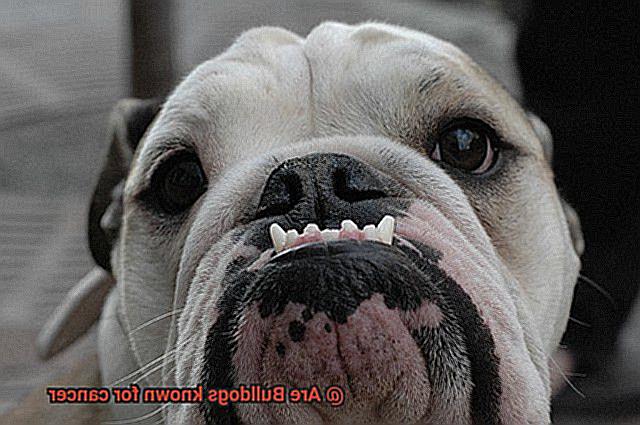
Hemangiosarcoma: A Stealthy Foe
Hemangiosarcoma is a malignant cancer that originates from blood vessel cells and commonly affects the spleen and heart in Bulldogs. Unfortunately, this type of cancer is often aggressive and challenging to treat. Regular veterinary check-ups are essential for monitoring your Bulldog’s health and catching any potential signs of this silent killer.
Osteosarcoma: When Bones Become Battlegrounds
Bulldogs are also prone to developing osteosarcoma, a type of bone cancer. This cancer primarily affects the long bones of the limbs and can cause lameness, swelling, and pain. Early detection and treatment, which may involve surgery or other interventions, can help manage your Bulldog’s pain and extend their quality of life.
Squamous Cell Carcinoma: Protecting Their Precious Skin
Squamous cell carcinoma is a type of skin cancer that can affect Bulldogs, particularly those with lighter-colored or sparsely-haired skin areas. This cancer often develops on the nose, ears, or around the mouth. Regularly applying pet-safe sunscreen and minimizing sun exposure can help reduce the risk of developing this type of cancer.
What Causes Bulldogs to be Prone to Cancer?
Let’s delve into the factors that contribute to Bulldogs’ increased risk of cancer and what you can do to protect your four-legged friend.
- Genetic Predisposition: Bulldogs, including French Bulldogs, have a relatively small gene pool. This limited genetic diversity has led to a higher incidence of certain genetic mutations that can increase the risk of cancer. It’s essential to be aware that Bulldogs are prone to developing mast cell tumors, lymphoma, and hemangiosarcoma.
- Mast Cell Tumors: The most common type of skin cancer found in Bulldogs is mast cell tumors. These tumors develop from mast cells, which are immune cells involved in allergic reactions and inflammation. Regularly checking your Bulldog for any lumps or bumps and promptly seeking veterinary attention if detected can greatly improve the chances of successful treatment.
- Lymphoma: Bulldogs also have an increased predisposition to lymphoma, a cancer of the lymphatic system. This type of cancer affects the lymph nodes and can spread throughout the body. Keeping an eye out for any changes in your Bulldog’s behavior or physical condition, such as enlarged lymph nodes or unexplained weight loss, is crucial for early detection.
- Hemangiosarcoma: Another cancer that Bulldogs are susceptible to is hemangiosarcoma, which originates from the blood vessels and can affect various organs such as the spleen, liver, and heart. Regular veterinary check-ups and diagnostic tests can help detect this aggressive cancer early on.
- Environmental Factors: While genetics play a significant role in Bulldogs’ cancer susceptibility, environmental factors can also contribute to their risk. Exposure to certain carcinogens or toxins, such as secondhand smoke or pesticides, may increase the likelihood of cancer development in any dog breed. Minimizing your Bulldog’s exposure to these harmful substances can help reduce their risk.
- Anatomical Characteristics: Bulldogs’ unique physical features, such as their short noses and compact bodies, can make them more prone to respiratory issues and overheating. These conditions have been linked to an elevated risk of certain cancers. Maintaining a cool and comfortable environment for your Bulldog, especially during hot weather, is crucial.
- Weakened Immune System: Bulldogs tend to have compromised immune systems compared to other breeds. This weakened immune response may make them more susceptible to developing cancer cells and less effective at fighting off their growth. Ensuring your Bulldog receives a balanced diet, regular exercise, and appropriate veterinary care can help support their immune system.
Remember that not all Bulldogs will develop cancer. Responsible breeding practices, proactive health management, and early detection through regular check-ups are vital in reducing the overall risk and ensuring the well-being of these beloved pets.
Genetics and Physical Characteristics of Bulldogs
You love your French Bulldog, with its adorable wrinkled face and unique physical characteristics. However, it’s important to be aware that Bulldogs, including French Bulldogs, have a higher risk of developing certain types of cancer compared to other breeds. In this blog post, we’ll dive deep into the genetics and physical characteristics of Bulldogs that contribute to their increased cancer risk. We’ll also provide you with tips on how to protect your furry friend and keep them wagging happily for years to come.
Genetic Predisposition:
Bulldogs have been selectively bred for generations, leading to their distinctive appearance but also resulting in limited genetic diversity. This limited gene pool increases the prevalence of genetic mutations associated with cancer. Additionally, Bulldogs have a genetic predisposition to certain types of tumors, such as mast cell tumors, making them more susceptible to developing cancer.
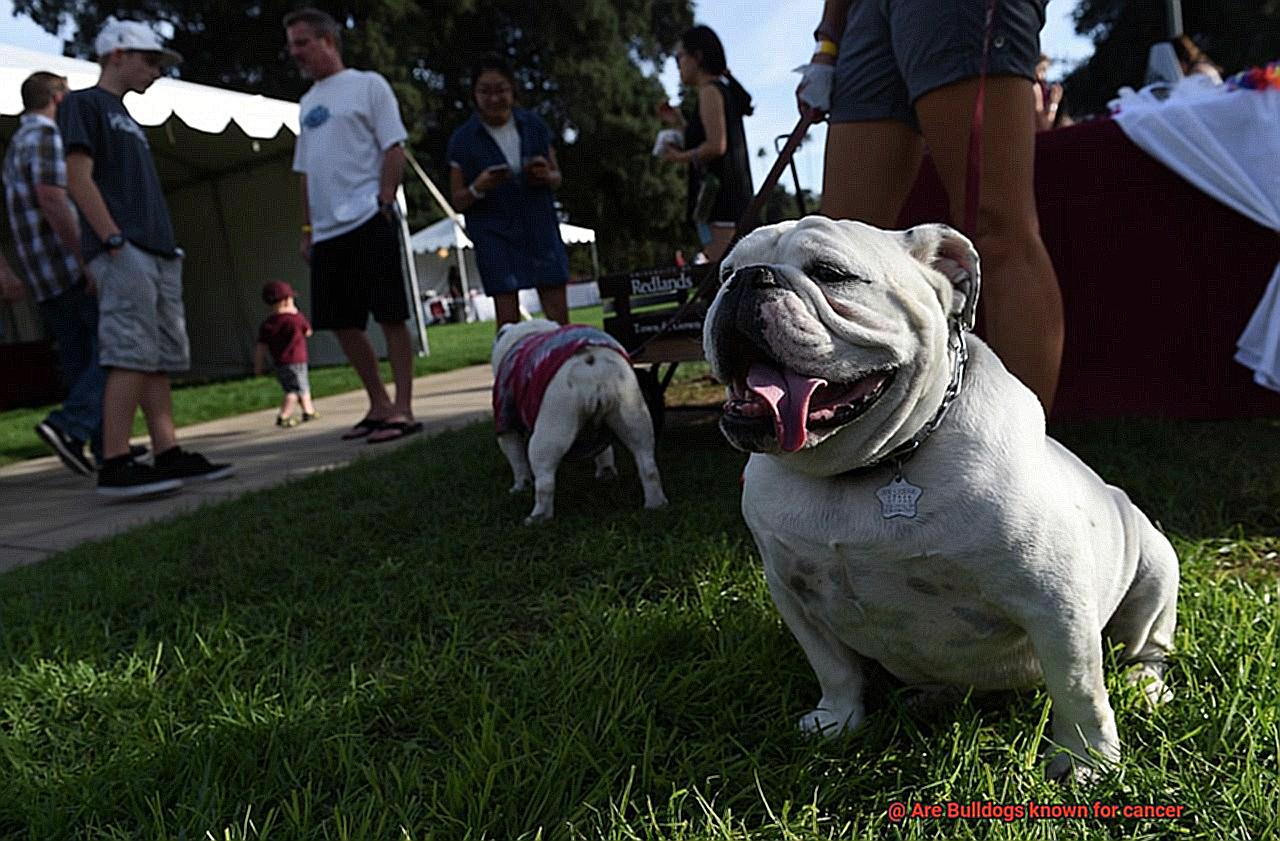
Brachycephalic Anatomy:
The unique brachycephalic nature of Bulldogs, characterized by their short and broad skull shape, can also contribute to an increased cancer risk. The compressed airways and abnormal respiratory anatomy in brachycephalic dogs can lead to chronic inflammation and oxidative stress, both known risk factors for cancer development.
Protective Measures:
While not all Bulldogs will develop cancer, there are steps you can take to minimize the risk for your furry friend:
- Regular Veterinary Check-ups: Regular check-ups and screenings are crucial for early detection and treatment of any potential health issues, including cancer. Early intervention greatly improves the prognosis for Bulldogs diagnosed with cancer.
- Healthy Lifestyle: Provide your Bulldog with a balanced diet and regular exercise to maintain their overall health. Avoid exposure to known carcinogens such as tobacco smoke and certain chemicals.
- Responsible Breeding: If you’re considering breeding Bulldogs, choose responsible breeders who prioritize genetic health and diversity. Selecting breeding pairs based on genetic screenings can help reduce the risk of passing on genetic predispositions to cancer.
Environmental Factors that Increase Risk of Cancer in Bulldogs
When it comes to our furry friends, the last thing we want is for them to suffer from cancer. Unfortunately, Bulldogs are a breed that is known to have a higher risk of developing certain types of cancer compared to other breeds. But fear not. By understanding the environmental factors that can increase their risk and taking necessary precautions, we can help protect our beloved Bulldogs.
- Chemicals and Toxins: Bulldogs have a genetic makeup and compromised immune system that make them more susceptible to the harmful effects of certain chemicals and toxins. Household cleaning products, pesticides, herbicides, and even secondhand smoke can be potential sources of these harmful substances. To keep your Bulldog safe, make sure to keep them away from areas where these substances are frequently used or stored. Also, keep their living environment clean and free from any potential hazards.
- UV Radiation: Bulldogs with light-colored or thin fur are particularly susceptible to the harmful effects of UV radiation, which can lead to skin cancer. So, next time you take your Bulldog out for a walk on a sunny day, make sure they have proper shade and use pet-safe sunscreen to protect their delicate skin. And remember, limiting outdoor activities during peak sunlight hours can also help reduce their exposure.
- Air Pollution: Air pollution is another environmental factor that can contribute to the increased risk of cancer in Bulldogs. Bulldogs with brachycephalic features, such as a flat face and narrowed airways, are more prone to respiratory issues caused by poor air quality. Avoid exposing your Bulldog to areas with high levels of air pollution, such as heavy traffic areas or industrial zones.
- Regular Vet Check-Ups: Regular veterinary check-ups are crucial for early detection and prevention of cancer in Bulldogs. Your veterinarian can perform thorough examinations and recommend appropriate preventive measures based on your Bulldog’s individual risk factors.
Early Detection and Regular Veterinary Check-Ups
We all want our Bulldogs to live long, healthy lives filled with endless belly rubs and slobbery kisses. Unfortunately, Bulldogs have a higher risk of developing certain types of cancer. But fear not, fellow Bulldog enthusiasts. We can be their protectors in shining armor by understanding the importance of early detection and regular veterinary check-ups.
Imagine this: you’re watching your favorite superhero movie when suddenly, the villain appears out of nowhere. Your heart races as you realize the danger your beloved superheroes are in. Early detection is like having your superhero senses tingling, alerting you to potential threats before they become overwhelming.
Early detection of cancer is crucial for Bulldogs. They may not be able to communicate their discomfort or pain, so it’s up to us to be their vigilant sidekicks. Regular veterinary check-ups allow us to monitor their overall health and detect any signs or symptoms of cancer at an early stage.
The Power of Veterinary Check-Ups
Just like superheroes have their trusty sidekicks, Bulldogs need regular veterinary check-ups to keep them in tip-top shape. These visits should include a thorough physical examination, where the veterinarian will check their skin, eyes, ears, mouth, lymph nodes, abdomen, and other vital organs.
But it doesn’t stop there. The veterinarian may also recommend additional tests such as blood work, urinalysis, x-rays, or ultrasound to evaluate their overall health and detect any abnormalities lurking beneath the surface. Think of these tests as your Bulldog’s secret weapons against cancer.
During these check-ups, the veterinarian will also rely on our keen observations. Any changes in behavior or appetite could be potential signs of cancer. So let’s channel our inner Sherlock Holmes and report any unusual symptoms or changes promptly.
The Benefits of Early Detection
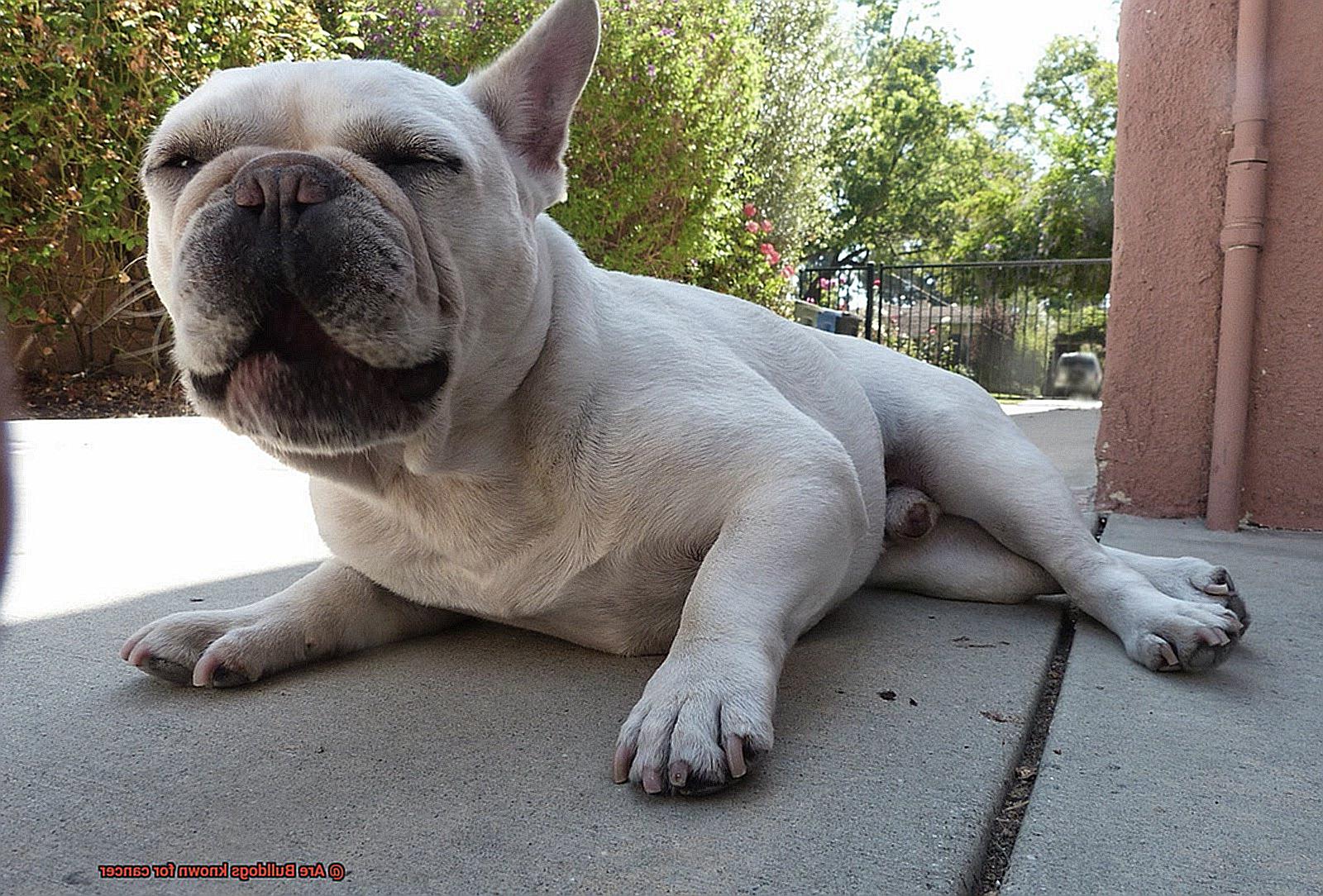
Early detection is like having a superpower. It increases the chances of successful treatment and improves our Bulldogs’ quality of life. By catching cancer in its early stages, we can save them from unnecessary suffering and give them a fighting chance.
Prevention is Key
Remember, prevention is better than cure. Regular veterinary check-ups not only detect cancer early but also provide guidance on preventive measures. Our veterinarians can recommend actions tailored to our Bulldogs’ individual risk factors.
Maintaining a healthy weight, feeding a balanced diet, and avoiding exposure to environmental toxins are just a few preventive measures that can reduce the risk of cancer in Bulldogs. Let’s be proactive in creating a safe and healthy environment for our furry friends.
Signs and Symptoms of Cancer in Bulldogs
Bulldogs are known for their lovable personalities and adorable wrinkles, but did you know they face a higher risk of cancer? As a Bulldog aficionado, it’s important to be well-versed in the signs and symptoms of cancer that might affect our four-legged companions. So, grab your cape and let’s dive into this critical topic.
Lumps and Bumps: A Call to Action
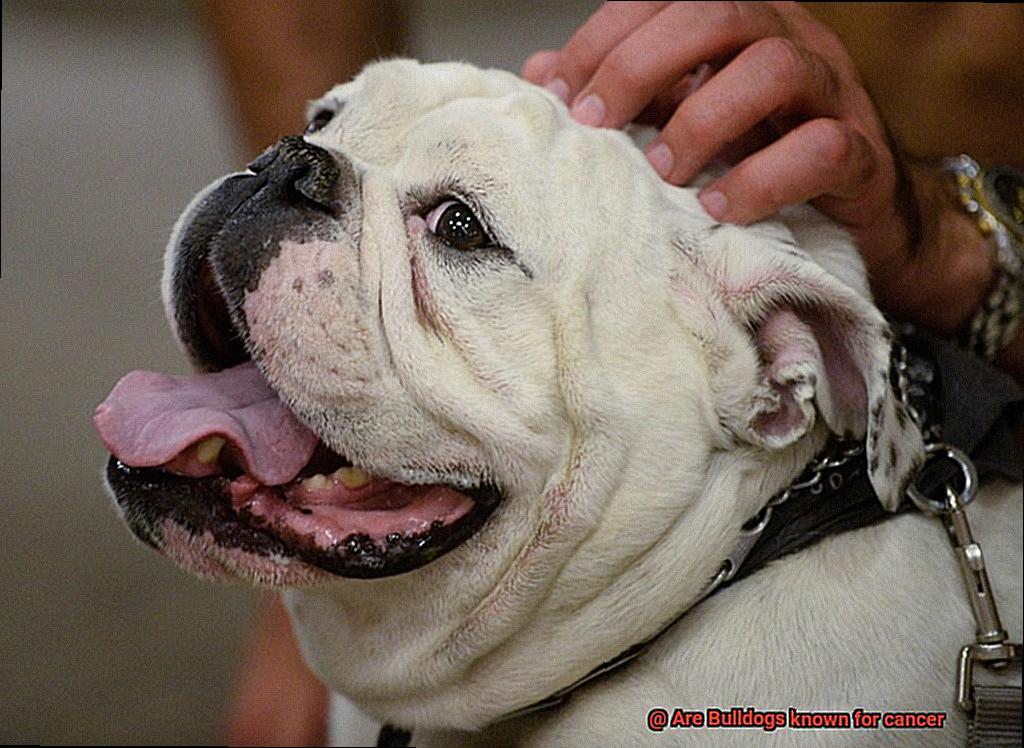
Picture yourself giving your Bulldog a good belly rub when suddenly, you feel an unexpected lump or bump. Don’t panic just yet. While not every lump is cancerous, it’s crucial to pay attention to any new or unusual growths on your Bulldog’s skin or inside their body. If you spot any, make sure to consult your veterinarian for a thorough examination.
Weight Loss: Not the Bulldog Diet They Deserve
We all know our Bulldogs have hearty appetites, but what if they start losing weight without any apparent reason? This could be a red flag for an underlying health issue, including cancer. If your Bulldog is shedding the pounds despite their normal eating habits and activity levels, it’s time to schedule an appointment with your vet.
Eating Habits: When the Chew is Off
Bulldogs are known for their love of gobbling down food, so any change in appetite or difficulty eating should raise concern. Cancerous tumors can cause discomfort or pain while eating, while certain types of cancer may affect the digestive system, leading to loss of appetite or difficulty swallowing. Keep an eye out for sudden changes in eating behavior and consult your veterinarian promptly.
Lethargy: A Bulldog Kryptonite
We all know Bulldogs have a reputation for being couch potatoes, but if your usually energetic pooch seems excessively tired or lacks interest in their favorite activities, it might not be just another lazy day. Cancer can drain their energy and make them lethargic. If your Bulldog is showing unusual signs of fatigue, it’s time to consult your veterinarian for a check-up.
Respiratory Symptoms: Breathing Woes
Imagine your Bulldog trying to catch their breath after a short walk—it’s heart-wrenching. Persistent coughing, wheezing, or difficulty breathing may indicate the presence of tumors in the lungs or airways. These symptoms should never be ignored and warrant immediate veterinary attention.
Remember, the signs and symptoms mentioned above can also be caused by other health issues. Nevertheless, being vigilant and seeking prompt veterinary attention can make a world of difference in your Bulldog’s health journey. Regular check-ups, early detection, and timely treatment can be the superpowers that save the day.
Improving Health and Minimizing Risk in Bulldogs
Regular Veterinary Check-ups: The Superpower of Early Detection
Just like superheroes have their sidekicks, Bulldogs need their trusted veterinarians. Regular check-ups and screenings are essential in detecting any signs of cancer early on. By partnering with your vet, you can increase the chances of successful treatment and ensure your Bulldog stays healthy for years to come.

Maintaining a Healthy Diet: Fueling Your Bulldog’s Superpowers
A healthy diet is the foundation of good health for Bulldogs. Obesity has been linked to an increased risk of certain cancers, so it’s crucial to maintain a proper weight for your furry friend. Consult with your vet to develop a balanced and nutritious diet plan that meets your Bulldog’s specific needs.
Exercise and Mental Stimulation: Keeping Those Superpowers Active
Just like superheroes need to stay fit, Bulldogs thrive with regular exercise and mental stimulation. Keeping your Bulldog active not only contributes to their overall well-being but also reduces the likelihood of developing health issues, including cancer. Engage in fun activities like brisk walks, puzzle toys, or interactive play sessions to keep those superpowers shining.
Preventive Measures: Shielding Your Bulldog from Harmful Forces
As superheroes protect their cities from villains, it’s our responsibility as Bulldog owners to shield them from harm. Taking preventive measures can help minimize the risk of cancer in Bulldogs. Limit exposure to harmful chemicals or toxins, keep up with vaccinations, and use flea and tick preventives to ensure your Bulldog stays safe.
Responsible Breeding Practices: Building a Superhero Bloodline
Superheroes often team up to fight against evil, and the same goes for responsible breeding practices. By selecting healthy individuals and avoiding breeding dogs with a known history of cancer, we can play a role in reducing the prevalence of cancer in future generations of Bulldogs.
7TqaIG-77wk” >
Conclusion
In conclusion, Bulldogs have unfortunately gained a reputation for being prone to cancer.
This devastating disease has affected many of these beloved dogs, causing heartbreak for their owners. It is important for potential Bulldog owners to be aware of this risk and take proactive steps to ensure the health and well-being of their furry companions.
Regular veterinary check-ups, a balanced diet, and a healthy lifestyle can all contribute to reducing the likelihood of cancer in Bulldogs. While no breed is entirely immune to this disease, being informed and proactive can make a significant difference in the lives of these wonderful dogs.
Let’s work together to raise awareness and support research efforts aimed at finding better treatments and prevention strategies for Bulldogs and all other breeds affected by cancer.
